Niche-Specific Questions for Coaching Questionnaires
For coaching services to be effective, different coaching niches require different questions to ask.
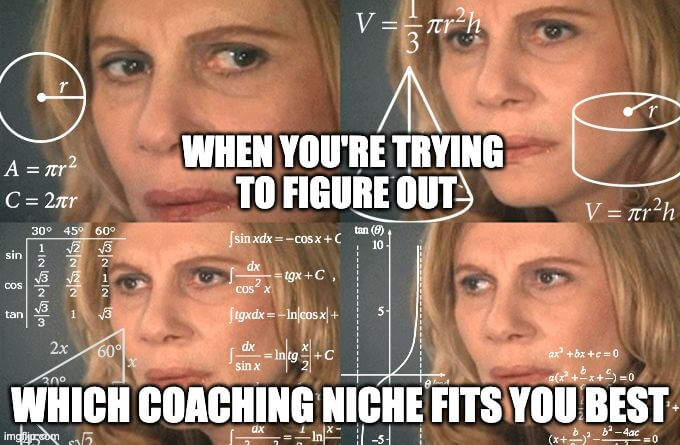
Below are the top 10 most common coaching niches, each containing 10 effective questions to be put in your coaching questionnaire.
1/ Life Coaching
Life coaching focuses on personal growth, values, and achieving a fulfilling life.
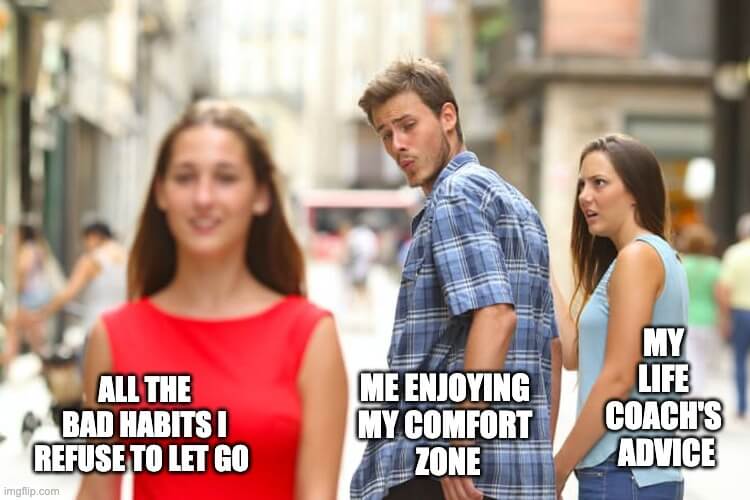
Powerful life coaching questions to ask:
What do you currently value the most in your life?
How would you like your life to look in one year? Three years? Five years?
What has been your biggest success so far, and what made it meaningful to you?
What are three things holding you back from reaching your goals right now?
On a scale of 1-10, how satisfied are you with your current life overall? Why did you choose that number?
What does success mean to you personally?
What habits or routines do you think are preventing you from living your ideal life?
How do you typically respond to challenges or setbacks in your life?
What would make your life more meaningful or purposeful right now?
If fear wasn’t a factor, what is one thing you would pursue immediately?
Pro Tip: Use storytelling prompts like “Describe a moment when you felt truly fulfilled” to encourage deeper answers.
2/ Health & Wellness Coaching
Health coaching addresses physical health, mental well-being, and lifestyle changes.
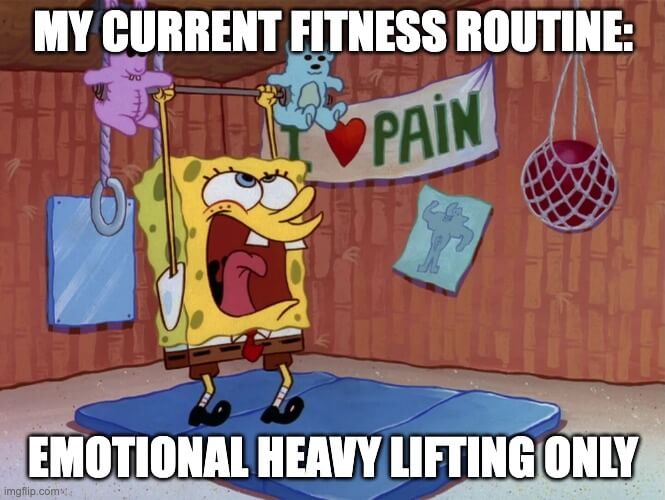
Questions to ask:
What are the top three concerns you have about your health right now?
How would you describe your current diet and exercise routine (if any)?
What is your primary health goal, and why is achieving it important to you?
How does stress affect your body (e.g., headaches, fatigue), and how do you currently manage it?
Have you made lifestyle changes in the past? If yes, what worked or didn’t work for you?
On a scale of 1-10, how would you rate the quality of your sleep right now? Why did you choose that number?
What barriers or challenges do you face when trying to improve your health or wellness?
How would achieving better health allow you to live a more fulfilling life?
What motivates or demotivates you when it comes to making healthier choices?
If we could focus on just one small change this week, what would it be?
Pro Tip: Pair questions with visual scales—for instance, use emojis or sliders for energy levels or stress ratings.
3. Career Coaching
Career coaching helps clients align their skills, passions, and goals with their professional paths.

(thanks to Imgflip for the memes)
Questions to ask:
What type of work environment excites or motivates you the most?
Where do you see yourself professionally in five years, and why is that goal important to you?
When have you felt most fulfilled in a job, and what made it fulfilling for you?
What skills or strengths make you stand out in the workplace today?
If money weren’t a factor, what career path would you pursue tomorrow?
How do you define success in your career personally (beyond salary)?
What challenges or obstacles have held you back professionally so far?
Who inspires you professionally, and what qualities about them resonate with you most?
How does your current role align with your personal values or long-term goals?
What steps can we take together to help advance your career starting today?
Pro Tip: Use frameworks like Ikigai (Purpose-Vocation-Passion) as inspiration for structuring career-related questions.
4. Executive Coaching
Executive coaching focuses on leadership development, team dynamics, and strategic decision-making.
Questions to ask:
How do others perceive your leadership style compared to how you see yourself as a leader?
What is one leadership skill you’d like to strengthen this year, and why is it important now?
How do you currently balance short-term goals with your long-term vision for the organization?
What feedback have you avoided addressing with your team, and what’s holding you back from doing so?
How do external pressures (e.g., market trends or industry changes) influence your decision-making process?
What strategies do you use to motivate and inspire your team to perform at their best?
How do you manage conflict within your team, and what approaches have worked well in the past?
What legacy or lasting impact do you want to leave as a leader in your organization or industry?
Who are the key stakeholders in your leadership journey, and how can we engage them more effectively?
If failure weren’t a factor, what bold decision would you make as a leader today?
Pro Tip: Include anonymous 360-degree feedback sections to gather honest input from team members. This can provide valuable insights into leadership strengths and weaknesses.
5. Business Coaching
Business coaching focuses on identifying inefficiencies, scaling operations, and achieving business growth.
Questions to ask:
What is your vision for success for both yourself and your business over the next five years?
Which areas of your business currently feel “broken” or inefficient, and why do they matter most right now?
Where do you spend most of your time: $10/hour tasks or $1,000/hour tasks? Why?
What is the biggest challenge or bottleneck preventing your business from growing further?
How would you describe your ideal client or customer, and are you currently attracting them effectively?
What systems or processes in your business could be improved to save time or increase efficiency?
How do you currently measure success in your business (e.g., revenue growth, customer satisfaction)?
What are the top three priorities for your business over the next quarter or year?
If you could delegate one task or responsibility today, what would it be and why?
What steps can we take together to help scale your business sustainably?
Pro Tip: Use profit-and-loss ratio questions to pinpoint financial inefficiencies that need attention.
6. Financial Coaching
Financial coaching focuses on helping clients understand their relationship with money, manage finances, and achieve financial goals.
Questions to ask:
What are your top three financial goals for the next year, and why are they important to you?
What challenges have you faced in managing your finances so far?
How confident are you in making financial decisions on a scale of 1-10? Why did you choose that number?
What is your earliest memory about money, and how does it shape your current financial habits?
Do you currently follow a budget? If not, what has prevented you from doing so in the past?
How would achieving financial freedom change your life or priorities right now?
What habits around spending or saving would you like to change moving forward?
How does debt affect your life (emotionally or practically), and what steps have you taken to manage it?
Who or what influenced your financial mindset growing up (e.g., parents, culture)?
If we could focus on just one small financial improvement this month, what would it be?
Pro Tip: Use anonymous budget templates to help clients feel more comfortable sharing sensitive financial information.
7. Relationship Coaching
Relationship coaching explores communication styles, emotional needs, and strategies to strengthen bonds between partners.
Questions to ask:
How do you and your partner typically handle conflicts or disagreements, and what would you like to improve?
What is one thing you admire most about your partner, and how do you express that admiration?
On a scale of 1-10, how satisfied are you with the current state of your relationship? Why did you choose that number?
What is your primary love language (e.g., words of affirmation, acts of service), and how does it align with your partner’s?
How do you express appreciation or gratitude in your relationship, and how would you like it to be reciprocated?
What recurring issues or arguments would you like to resolve, and why are they important to address now?
How do external factors (e.g., work stress, family dynamics) impact your relationship?
What are three things you’d like to improve about your communication with your partner?
How do you and your partner spend quality time together, and what activities bring you closer?
What does a healthy and fulfilling relationship look like to you, and how can we work toward that vision?
Pro Tip: Incorporate frameworks like the 5 Love Languages to structure questions around emotional needs and communication styles.
8. Mindset Coaching
Mindset coaching focuses on overcoming limiting beliefs, building resilience, and fostering a positive mindset and growth-oriented perspective.
Questions to ask:
What are the top three values that guide your decisions and actions in life?
What limiting beliefs might be holding you back from achieving your goals, and where do they stem from?
How do you typically respond to failure or setbacks, and what would you like to change about that response?
What does success mean to you personally, beyond external achievements or recognition?
If fear weren’t a factor, what is one thing you’d pursue immediately in your life or career?
How do you handle unexpected changes or challenges in life right now?
What’s one habit or thought pattern you’d like to change about yourself, and why does it matter now?
Who inspires you the most, and what qualities about them resonate with you deeply?
How do you celebrate small wins or achievements in your life currently, if at all?
If money or time weren’t an issue, what would your ideal day look like?
Pro Tip: Add a “Belief Audit” section where clients can challenge assumptions (e.g., “Is this belief serving me?”).
9. Nutrition Coaching
Nutrition coaching focuses on dietary habits, health goals, and creating sustainable eating plans.
Questions to ask:
What are your primary health and nutrition goals for the next six months, and why are they important to you?
How would you describe your current eating habits (e.g., balanced, emotional eating)?
Do you have any food allergies or sensitivities that we should consider in planning meals?
How often do you prepare meals at home versus eating out, and how does this impact your health goals?
What is one small dietary change you’ve successfully made in the past, and how did it help you?
On a scale of 1-10, how satisfied are you with your current energy levels throughout the day? Why did you choose that number?
How does stress affect your eating habits (e.g., overeating or loss of appetite)?
Are there specific foods or drinks that make you feel better or worse after consuming them?
What motivates or demotivates you when it comes to sticking to a healthy diet plan?
If time weren’t an issue, how would you ideally approach meal planning and preparation?
Pro Tip: Encourage clients to use photo journals (via apps like MyFitnessPal) alongside written answers for more accurate tracking.
10. Leadership Coaching
Leadership coaching helps individuals develop skills such as communication, decision-making, and team management.
Questions to ask:
How would others describe your leadership style compared to how you perceive yourself as a leader?
What is one leadership skill you’d like to improve over the next year, and why is it important now?
How do external pressures (e.g., market trends or organizational changes) influence your decision-making process?
When faced with conflict within your team, what strategies have worked well for resolving it in the past?
How do you balance short-term organizational goals with your long-term vision as a leader?
Who are the key stakeholders in your leadership journey, and how can we engage them more effectively?
What legacy or long-term impact do you want to leave behind as a leader in your organization or industry?
How effectively does feedback flow within your team, and what would you like to improve about this process?
What bold decision would you make as a leader today if failure weren’t a factor?
How do you currently motivate and inspire your team to perform at their best, and what could enhance this further?
Pro Tip: Use scenario-based questions (e.g., “How would you lead during a company crisis?”) to assess decision-making skills under pressure.
Why Coaching Questionnaires Matter for Your Coaching Sessions
Think of a coaching questionnaire as a “client X-ray.” It helps you see beyond surface-level coaching conversations and uncover deeper challenges, goals, and mindset blocks.
But questionnaires do more than collect data—they set the tone for your entire coaching relationship.
This means that a well-crafted questionnaire can improve both client retention and outcomes. It also indirectly showcase your coaching skills.
Types of Coaching Questionnaires
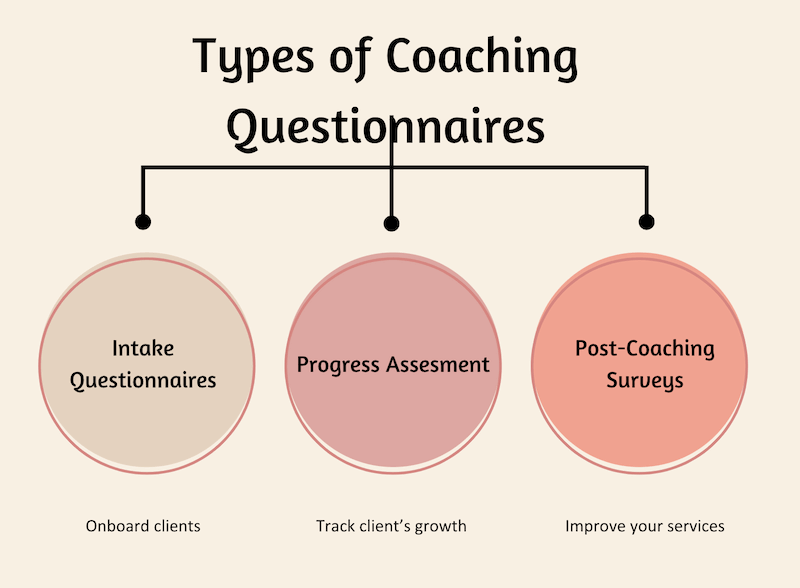
Not all coaching questionnaires are created equal. Each type serves a specific purpose in your coaching process.
1/ Intake/Discovery Questionnaires
These are used during onboarding to understand your client’s history, goals, and readiness for change.
Example Questions:
“What’s the biggest obstacle holding you back right now?”
“How do you typically handle stress?”
Pro Tip:
Keep intake forms under 15 questions. Studies consistently show that shorter forms lead to higher completion rates.
For example, forms with fewer fields can boost conversions by up to 160% (Martech Zone), and participants are 50% more likely to respond to shorter questionnaires compared to longer ones (PMC). Additionally, shorter surveys—especially those that take less than 10 minutes—yield significantly higher response rates (Kantar).
2/ Progress Assessment Forms
These forms help track your client’s growth over time and measure the effectiveness of your coaching.
Example Questions:
“On a scale of 1-10, how confident do you feel about achieving your goal today vs. 3 months ago?”
“What’s one skill you’ve improved since starting this program?”
3/ Post-Coaching Feedback Surveys
Feedback surveys allow you to improve your services by understanding what worked (and what didn’t) for your clients.
Example Questions:
“What’s one thing I could do to become a better coach for you?”
“Which part of the coaching process did you find most valuable?”
By using these three types of questionnaires strategically, you can create a seamless experience for your clients—from onboarding to progress tracking to post-coaching reflection.
Designing High-Impact Questionnaires
Creating an effective questionnaire requires careful planning.
Here’s how to do it:
1/ Define Your Goal
Before writing any questions, ask yourself: What am I trying to achieve with this questionnaire? Are you gathering logistical information? Assessing mindset? Tracking progress?
For example, health coach Liz Josefsberg, who has worked with Weight Watchers, uses questionnaires to identify emotional eating triggers in her clients. This helps her create personalized plans instead of offering generic advice.
2/ Craft Empowering Questions
The way you phrase questions matters.
Avoid leading questions like, “Do you struggle with time management?”
Instead, ask open-ended questions like, “How would you describe your relationship with time?”
This encourages honesty and deeper reflection without making clients feel judged.
3/ Balance Question Types
A good questionnaire includes a mix of question formats:
Open-ended questions: Encourage detailed responses (e.g., “What does success look like to you?”).
Scale-based questions: Provide measurable insights (e.g., “Rate your current work-life balance on a scale of 1-5.”).
Multiple-choice questions: Offer structure (e.g., “Which areas do you want to focus on? [Career, Relationships, Health]”).
By combining these formats, you’ll gather comprehensive insights without overwhelming your clients.
Avoid These Common Mistakes
Even experienced professional coaches make mistakes when designing questionnaires.
Here are three pitfalls to avoid:
A/ Too Many Questions
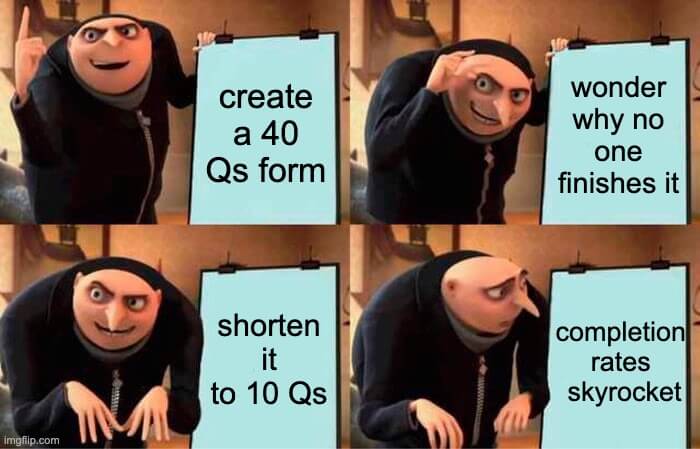
Vial, a clinical trial company, increased form completion rates by 30% after shortening its forms from 30-40 questions to a simpler flow. This shows how reducing the number of questions can improve completion rates.
Source: Formsort
B/ Jargon Overload
Replace technical terms like “What’s your BHAG?” with simpler language like “What’s your biggest long-term goal?”
Ignoring Privacy Concerns
Always explain how client data will be stored and used.
TL;DR
Coaching questionnaires are more than just tools—they’re the backbone of a successful coaching practice. Great questionnaires accompanied by great coaching habits = tough not to succeed.
By designing thoughtful forms tailored to your niche, you’ll gain deeper insights into your clients’ needs, build stronger relationships, and deliver results that truly make an impact.
Related Reading
- SendOwl vs SamCart: The Recurring Revenue Jail (2026)
- ThriveCart vs ClickFunnels: When more features hurt (2026)
- SendOwl vs Payhip: The “You-Leave-You-Lose” Model (2026)
- SamCart vs Kajabi: The Income Hostage Trap (2026)
- Sellfy vs Payhip: The Recurring Revenue Prison (2026)
- Podia vs Gumroad: The Recurring Revenue Handcuffs (2026)
- SendOwl vs Gumroad: The Recurring Revenue Black Hole (2026)
- Gumroad vs Sellfy: The Vendor Lock-in Cage (2026)
- Gumroad vs Payhip: The Hidden Trap for Creators (2026)
- ThriveCart vs SamCart – The Subscription Hostage Trap (2026)
